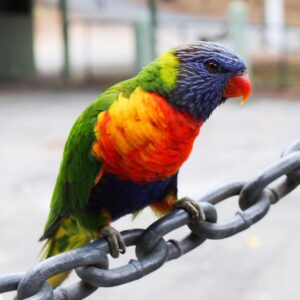Lorikeet For Sale
Lorikeet For Sale
Lorikeet for sale,Lories and lorikeets are very playful birds. They love to play with people, toys, and whatever else they can get their “beaks” onto! Lorikeets like to be very active and love to perform lots of antics, from just showing off in general to swinging upside down on bars, perches and swings.
Care and feeding of Lorikeet
The lorikeet’s main diet consists of nectar and fruit. They can eat some greens and some seed. Special diets which can be purchased at most pet stores have been formulated to feed the bird in either a wet form as a nectar or in a dry form as a powder. Make sure you have water near the powder, if that is what you are feeding, so the bird can take drinks while eating. Fresh fruit or unsweetened canned fruit should be fed regularly.
Personality & Behavior
The lory personality is intense, in general. This is not a shy species. The rainbow lory is bubbly and enthusiastic, the “coach” of the bird world, encouraging play whenever its favorite human is around. These birds are constantly busy and lively, allowing little time for rest. Their antics are extremely entertaining for most people, but they can become a little much for someone that’s used to a more laid-back companion.
Playtime is crucial for the lorikeet, and the rainbow lorry will relish time out of the cage to spend with its guardian. This need should be indulged as often as possible. A rainbow lory that’s left alone too often will develop behavior disorders and may begin to self-mutilate. Warn new guardians to be watchful when the bird is out of the cage, however, because this active bird tends to be mischievous and destructive, and will get into trouble quicker than someone can save it from harm. Because this bird is so excitable and intelligent, it is also often nippy, and will generally bite only out of excitement or fear.
Speech and Vocalizations
Rainbow lorikeet for sale are excellent talkers, and they can learn to say many words and phrases. They are noisy birds and have a high-pitched tone with frequent squawks. Their sometimes shrill vocaizations can be abrasive and unpleasant to some people. This bird is not the ideal pet for people who have close neighbors who are sensitive to loud sounds.
Temperament
Lorikeets are affectionate birds noted for their amusing behaviors and friendly nature. These birds are generally friendly, easy to socialize, and enjoy interaction with their human keepers.
During their training, feed these young birds by hand. They will develop accustomed to human touch and may become less agitated.
This bird is extremely bright and capable of learning tricks and other actions. Because it is so intelligent, it is also a skilled escape artist. Cage door locks are required.
Most lories get along well with other bird species, although they can be quite territorial and jealous.1 They can be nasty with birds of their own species and should never be left alone with other birds.
Bird Exercise
Exercise and activities are extremely important to keep your pet bird healthy and happy. Birds are inquisitive, social, and they like to play. Exercise is natural for them and easy to provide.
Short Flights
A bird’s cage needs to accommodate their full wingspan so they can safely flap their wings and exercise them. If they are kept in the cage all the time, they need to be able to make short flights. A cage should be at least three times their wingspan if they are kept caged all the time. Small birds, like finches and canaries, primarily flutter from perch to perch and make short flights. They are generally always kept in their cage or aviary and can be difficult to catch if they get out.
Showing the single result
-
$500.00 – $1,150.00

